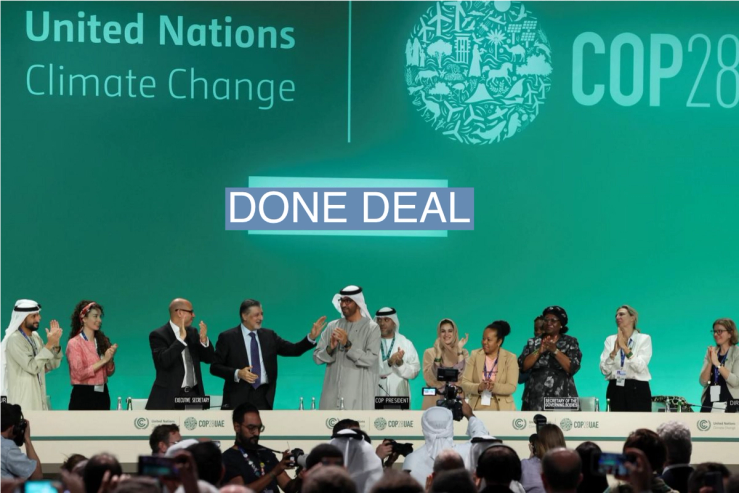The News
DUBAI — After nearly three decades of global climate negotiations that avoided specifically targeting the main cause of climate change — the burning of coal, oil, and natural gas — diplomats on Wednesday concluded the COP28 summit in Dubai with an agreement to “transition away from fossil fuels in energy systems, in a just, orderly and equitable manner, accelerating action in this critical decade, so as to achieve net zero by 2050.”
The deal falls short of the language that most activists and negotiators had called for, namely a complete “phase out” of fossil fuels. It also lacks specific targets for climate impact adaptation, leaves unresolved questions over controversial carbon-capture technology, and eschews a mandate for wealthy countries to ramp up financial assistance for clean-energy in developing countries.
Still, the agreement leaves no ambiguity that the official policy of global governments is that the era of fossil-fuel consumption and production is ending, an unprecedented statement. Now comes the hard part: Actually “transitioning away” from fossil fuels, especially in the face of growing demand for oil and gas.
“An agreement is only as good as its implementation. We are what we do, not what we say,” said Sultan al-Jaber, the summit president. “We must take the steps necessary to turn this agreement into tangible actions.”
In this article:
Tim’s view
The outcome of this summit was in some ways inevitable. 2023 was the warmest year on record; next year will likely beat it. As the human and economic toll of climate disasters mount, many companies and governments are realizing that the costs of curbing emissions are far lower than the costs of adapting to impacts or paying climate reparations. That’s especially true as the costs of renewable energy, batteries, and related technologies continue to plummet. U.S. climate envoy John Kerry and his Chinese counterpart Xie Zhenhua will both retire from their roles after this COP, and were deeply committed to going out with a bang that would cement their legacies as climate leaders.
And at the helm was al-Jaber, an oil executive who weathered scandals and criticism in the runup to the summit but proved an adept diplomat in forcing countries to compromise. If anything, his fossil-fuel background was a powerful asset. The UAE is relatively advanced in diversifying its economy compared to other Gulf producers, a process that al-Jaber has personally steered.
“For al-Jaber to acknowledge, as a petrostate, that some kind of phase-out language needs to be included provided so much credibility to this,” said María Mendiluce, CEO of the We Mean Business Coalition, a nonprofit representing climate-focused corporations.
Still, the agreement is not legally binding, and won’t immediately change the pace of the energy transition. Now it’s up to individual countries to put in place the specific legal policies — clean-energy tax credits, infrastructure permitting reforms, emissions regulations — that will make the transition possible.
In the end, al-Jaber’s strategy for building a consensus against fossil fuels hinged on incorporating language into the agreement that sufficiently assuaged the concerns of oil-exporting countries like Saudi Arabia that the transition won’t leave them in the dust. That includes acknowledging the role of “transitional fuels,” a coded reference to natural gas replacing coal in the power sector, as well as creating space for carbon capture. The agreement also took some heat off the U.S. and other large historic emitters by adopting fairly vague and noncommittal language about climate finance.
Even in the absence of additional policy measures, the private sector will read the outcome of COP28 as an unambiguous signal about the trajectory of the global economy, and begin to plan and invest accordingly, Mendiluce said.
“Companies will choose to work in the countries that have the most enabling policy environments,” she told me. “We’re hoping for a race to the top. That will lead to a massive scale-up of the solutions, and then prices for clean-energy technologies will go down for the whole world.”
Still, the transition will be turbulent. No matter what governments say or do, oil and gas companies will continue to deliver what markets ask them for. Even the most generous models indicate that global oil demand will rise for at least another five to 10 years, and gas likely longer than that, said Mukesh Sahdev, head of oil trading analysis at the research firm Rystad Energy. Oil and gas companies that are already investing in alternative technologies like carbon-capture, hydrogen, and biofuels stand to benefit from COP28’s mandates and could see their share prices rise in the short term. But in general the disconnect between those mandates and the reality of global fossil-fuel demand means the energy security drama of the last few years will only intensify, he said, as energy companies lose any incentive to invest in fossil-fuel production or infrastructure. The upshot, Sahdev added, is that “higher volatility and prices are here to stay.”
Room for Disagreement
One of the biggest tests in the next few years will be whether Mendiluce’s prediction — that rising investment in clean-energy in developed countries will indirectly subsidize the transitions of developing countries — proves true. Delegates from the most vulnerable countries, and many civil society groups, remain concerned that the transition “is not funded or fair,” said Mohamed Adow, director of the advocacy group Power Shift Africa. “We’re still missing enough finance to help developing countries decarbonise and there needs to be greater expectation on rich fossil-fuel producers to phase out first.”
The View From China
Developed nations should “take the lead” in transitioning away from fossil fuels and offer financial support for developing countries, Chinese Environment Vice Minister Zhao Yingmin told conference attendees. “Developed countries have an unshakable, historical responsibility for climate change and therefore must take the lead to embark on the 1.5 degree Celsius pathway ahead of the rest of the world,” he said.
— Jenna Moon contributed reporting.


